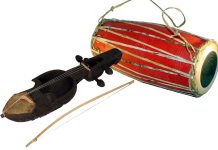Alexander the Great is an ideal character in the history of humanity. There was no limit or impossible action for him. In the modern age, military defense thinks of him as the greatest generals they have ever known. I got curious about him because of several reasons and some of them are his leadership, alertness, knowledge on using power of punishment, paying attention to the affairs of the kingdom, supervising the work of all the armies by himself, strategic planning, leading by example, his straightforwardness, self- motivation and strong determination ! These qualities might have helped him to be Alexander the Great.
Likewise, anyone who possesses these qualities is feared by his enemies and respected by them as well. Therefore, several city-states and countries that had fallen did not dare to fight even when Alexander was outnumbered. I think that 90 percent of a leader’s chance of success or failure lays with his/her character. Alexander was such a person that his armies felt proud to march with him even in the desert for many days. They were ready to march with him anywhere he wished. He was also diplomatic as he obeyed local customs in order to make locals happy and win their hearts. Alexander’s armies were equally concerned about him like when they were marching in the desert and they ran out of water. One of his troops gave him the only water he had, but Alexander refused to drink it and said, “If I am only one to drink, the rest will lose heart” (Plutarch, The Age of Alexander). In the meantime, his qualities are backed by his strong determination. Alexander never gave up, and he seemed as if nothing could stop him. I believe that the difference between possibilities and impossibilities lies on his/ her determination and if you really think you can, you can.
Alexander the great was born in 356 BC on 20th of July in Pella of Macedonia. He was the son of King Philip and Olympia. Philip united many tribal groups and became the king of Macedonia in 359. Philip was a great leader and he was a good organizer of his country and the armies. He created a strong Macedonian army that was probably one of the strongest armies in the world during that period. In addition to that, these armies were also trained to march and carry weapons for long distances. Which was probably an advantage for Alexander later when he conquers the world. Alexander grew up in an environment where there was war, celebration of victories, unrest, rumors, and threats to the nation from neighboring enemies. Nevertheless, he would have understood how brave his father was, when he learned about the success of his new victories.
On one of the occasions when Ambassadors from Persia arrived in Macedonia, during Philip’s absence, Alexander welcomed them with warm hospitality and started communicating in a friendly manner asking them questions few good leaders would have asked, such as how long they traveled to reach Macedonia, Kingdom of the Persian Empire, about the king’s character, his experience in the war, military strengths. I wonder if he had a plan to invade Persia, even when he was a kid. Likewise, on another occasion when someone brought a wild, uncontrollable horse called Bucephalas to sell to Philip, nobody would dare to control the horse, and then Alexander showed the willingness to control it before his father could send the horse away. Alexander approached the horse, calmed him with a gentle touch, adjusted the bridle, and faced him towards the sun. When the horse became calm, he rode the horse. Philips felt proud to see his son riding the horse and said, “My boy, you must find a kingdom big enough for your ambitions. Macedonia is too small for you.” (Plutarch, The Age of Alexander). Then Philip sent Alexander to Aristotle (Arastu in Hindi), at the age of thirteen, where he learned Philosophy, science, principles of politics and medicine. He remained there until he was seventeen. Alexander had a warm relationship with his teacher.
However, in later years, Alexander seemed to be unhappy. He looked at Aristotle with suspicion and found his master wrong when he reached at the top of the mountains of the Indus valley and saw India far beyond. Aristotle had said India was a small island. When Alexander was nineteen, Pausanias, a young man of Macedonia, assassinated his father. It is still unknown why he killed Philip, Some say that it was a plan created by Olympias and Alexander to kill Philip. When the murderer was trying to escape one of Alexander’s friends killed him immediately. After the death of Philip, there was a great threat to Macedonia, it was likely that the neighboring rivals such as Greece, Persia and even the domestic enemies of Macedonia could attack them.
Keeping these factors in mind, the people of Macedonia decided to declare him the king of Macedonia. Alexander acted very quickly; he started his campaigns by defeating the enemies within Macedonia and moved towards Greece in a hope to build his empire starting from Macedonia and then to Asia and to the end of the world.
He started from Troy, marching with troops of about 35,000. Alexander took control of many city-states – the Ankara, Tarsus, and then Issue. It is believed that Alexander had about 43,000 infantry and 6,000 cavalry troops along with geographers, astronomers, historians, and zoologist. This is how he started to invade Persia or modern day Iran. The battle of Issue took place in 336 BC against his greatest enemy, Darius the great. Darius came with large armies but due to courage and bravery, Alexander won the battle and the king of the Persian Empire fled. Alexander’s solders captured his family. The victory of Issue gave him access to Syria and Phoenicia. Phoenicia surrendered after the battle in Tyre. Then Alexander moved towards Egypt and entered during 331 BC. Here, the Egyptians welcomed Alexander as a Liberator. Alexander demanded to name the port into his name and today it is known as port Alexandria of Mediterranean. Alexander went to visit the Egyptians sun god, whom the Macedonians pray to as Zeus Ammon and the earlier Egyptian pharaohs were believed to be the sons of Ammon. According to the legend, when Alexander was making a trip to visit Zeus, the god had mercy on him and there was rain while he was crossing the desert. In addition, when he reached the temple the priest welcomed him and Alexander asked the oracle of Amon, if he was the son of god? The answer arrived and the priest told him that he was the son of Zeus and the ruler of the world.
After Egypt, he marched towards Persia. At the river of Gaugamela, heavy fighting took place Alexander also faced heavy casualties. Then he moved towards the Persian capital Persepolis. The battle took place and great Macedonian armies defeated the Persians and their king Darius fled once again. Here in Persepolis, Alexander finds a greatest treasure. Historians believe that Alexander might have found about 3,000 tons of gold. At the palace, he also saw a great statue of ancient king Ahuramazda, also known as a King of wisdom.
Moreover, 35 kings from different parts of the world paid him tributes. At this point, Alexander must have been delighted to see the great Persian Empire falling into his hands.
After some months, they had a party and wine session. After they got drunk; one of the women got bored and asked Alexander if he would set the palace on fire. Alexander agreed and gave order to burn the palace and in no time the palace is destroyed. Alexander is considered by many to have a demons head and they call him the two-horned one. The Jonorastians, a religious group of Persia still believes that Alexander had not only burned the palace but that he had burned their spiritual books scriptures. He is the two-horned one evil and called Sul-ta-mae (In the footsteps of Alexander the great, video-vol II) for them.
To the contrary, some Muslims believe that prophet Mohammed gave him blessing for his campaigns. The Persian told Darius to abandon the kingship, because they wanted a new leader who was brave and could fight Alexander.
When Darius refused them, they tortured and killed him. Alexander approached him he saw dead body of the Darius. Alexander moved across the Khawak pass towards the Hindu Kush (20,000 ft) in his fifth years of campaigns, in 326 BC through Kabul. It would have been very difficult for the soldiers to cross these mountains and they might have suffered from attitude sickness, dizziness, dehydration, malnutrition, and a lot more. After they had reached the top of the Khawak pass, he marched towards the desert of Tashkurgan where he and his armies suffered due to starvation for several days before they moved ahead and finally found the river. Alexander marched towards Balkh. He was injured playing a local game called Bujkashi and when he recovered, he marched towards Tajikistan on a search and destroys operation. He then marched towards Uzbekistan. He saw Roxanne and he fell in love with her at first sight. He proposed to her and married her when he was 29.
In 327 BC Alexander marched towards India and invaded Punjab. King Porus foght bravely against him with elephants and armies but he was eventually captured. Alexander was very impressed with, the way Porus fought the battle, bravely and allowed him to govern his own country. In this battle, Alexander’s horse Bucephalus was badly injured and died. Later, Alexander founded a city called Bucephalus in honor of his horse. The army continued advancing to unknown territories and then Alexander’s general spoke to Alexander on behalf of his armies and asked him not to advance beyond this. Alexander agreed. Alexander’s armies built thousands of ships in order to sail the river on their way back home. At the Indian village of Malli, they stopped and a battle took place. Alexander was seriously wounded in this battle when an arrow hit him.. The returning westward route towards Persia was a mistake and hundred and thousands of solders were dead due to the heat and droughts in the desert but finally they arrive in Susa.
In the spring of 324, Alexander held a great victory and celebration took place at Susa. Some of his nobleman married Persian women. Little later, at Opis he proclaimed the discharge of 10,000 Macedonians veterans to go to Macedonia with general Craterus. In the same time 30,000 Persians, youths were recruited in the Army. In a hope to create a new royal army, which would be attached only to him. In addition, at the end of the year Alexander traveled to Babylon where he got caught with fever and day after another the fever got worse on 25 day of his fever he slept a little, but fever went bad and on the 28th day he died. Nevertheless, it is still unknown what caused the fever, whether he was poisoned, or was it a plot by his enemies. Some historian believe it was Aristotle who was behind Alexander’s murder, they think Aristotle arranged someone to put the poison in Alexander’s drink.
However, many historians disagree with this idea what cause the death of the great king, but it is still unknown. No matter what the truth is, Alexander the Great is one of the best examples of great leadership and vision. He showed the respect for the women when Thracian troop leaders raped a woman called Timocleia, she tricked him and killed the rapist, then she was brought in front of Alexander. Alexander let her go because she was innocent. He treated Darius’ wife and daughter with respect. He showed gesture of love towards his loved ones by sending gifts to them. He was always ready for challenges, and loved philosophy. He even read and carried his books with him. He wasn’t just “book smart” because he knew how to use local guides to show the trails his army used. More importantly, his thoughts, words, and deeds were harmonized and he became a trust worthy leader and ultimately his lion-like character led him towards success. Truly, the story of Alexander the great has given many people inspiration including myself.
– Bibek Karki












































